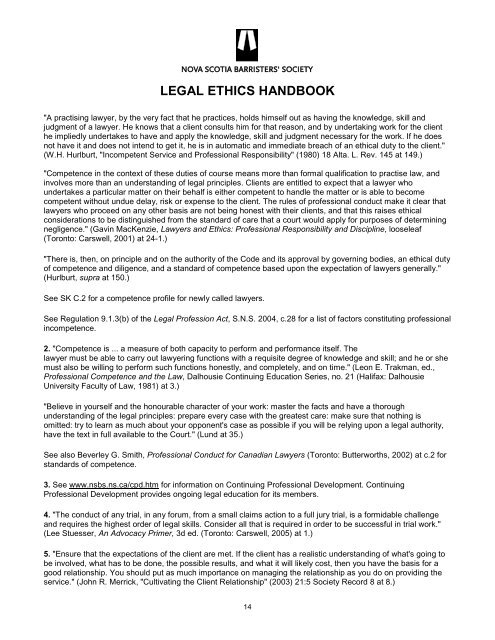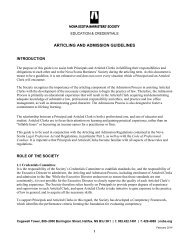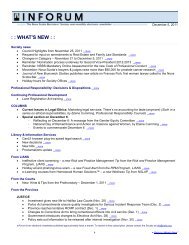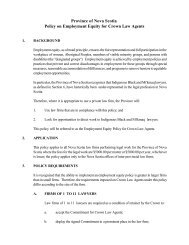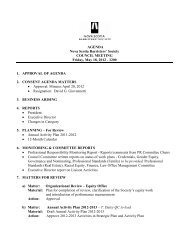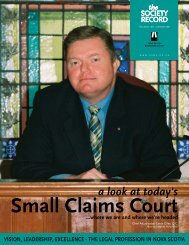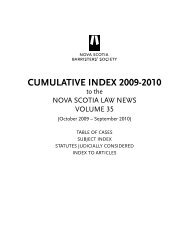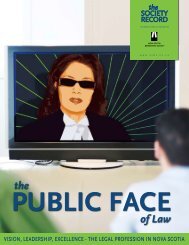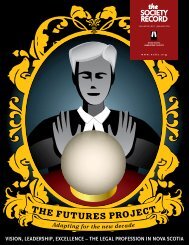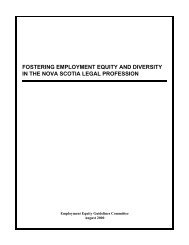legal ethics handbook - Nova Scotia Barristers' Society
legal ethics handbook - Nova Scotia Barristers' Society
legal ethics handbook - Nova Scotia Barristers' Society
Create successful ePaper yourself
Turn your PDF publications into a flip-book with our unique Google optimized e-Paper software.
LEGAL ETHICS HANDBOOK<br />
"A practising lawyer, by the very fact that he practices, holds himself out as having the knowledge, skill and<br />
judgment of a lawyer. He knows that a client consults him for that reason, and by undertaking work for the client<br />
he impliedly undertakes to have and apply the knowledge, skill and judgment necessary for the work. If he does<br />
not have it and does not intend to get it, he is in automatic and immediate breach of an ethical duty to the client."<br />
(W.H. Hurlburt, "Incompetent Service and Professional Responsibility" (1980) 18 Alta. L. Rev. 145 at 149.)<br />
"Competence in the context of these duties of course means more than formal qualification to practise law, and<br />
involves more than an understanding of <strong>legal</strong> principles. Clients are entitled to expect that a lawyer who<br />
undertakes a particular matter on their behalf is either competent to handle the matter or is able to become<br />
competent without undue delay, risk or expense to the client. The rules of professional conduct make it clear that<br />
lawyers who proceed on any other basis are not being honest with their clients, and that this raises ethical<br />
considerations to be distinguished from the standard of care that a court would apply for purposes of determining<br />
negligence." (Gavin MacKenzie, Lawyers and Ethics: Professional Responsibility and Discipline, looseleaf<br />
(Toronto: Carswell, 2001) at 24-1.)<br />
"There is, then, on principle and on the authority of the Code and its approval by governing bodies, an ethical duty<br />
of competence and diligence, and a standard of competence based upon the expectation of lawyers generally."<br />
(Hurlburt, supra at 150.)<br />
See SK C.2 for a competence profile for newly called lawyers.<br />
See Regulation 9.1.3(b) of the Legal Profession Act, S.N.S. 2004, c.28 for a list of factors constituting professional<br />
incompetence.<br />
2. "Competence is ... a measure of both capacity to perform and performance itself. The<br />
lawyer must be able to carry out lawyering functions with a requisite degree of knowledge and skill; and he or she<br />
must also be willing to perform such functions honestly, and completely, and on time." (Leon E. Trakman, ed.,<br />
Professional Competence and the Law, Dalhousie Continuing Education Series, no. 21 (Halifax: Dalhousie<br />
University Faculty of Law, 1981) at 3.)<br />
"Believe in yourself and the honourable character of your work: master the facts and have a thorough<br />
understanding of the <strong>legal</strong> principles: prepare every case with the greatest care: make sure that nothing is<br />
omitted: try to learn as much about your opponent's case as possible if you will be relying upon a <strong>legal</strong> authority,<br />
have the text in full available to the Court." (Lund at 35.)<br />
See also Beverley G. Smith, Professional Conduct for Canadian Lawyers (Toronto: Butterworths, 2002) at c.2 for<br />
standards of competence.<br />
3. See www.nsbs.ns.ca/cpd.htm for information on Continuing Professional Development. Continuing<br />
Professional Development provides ongoing <strong>legal</strong> education for its members.<br />
4. "The conduct of any trial, in any forum, from a small claims action to a full jury trial, is a formidable challenge<br />
and requires the highest order of <strong>legal</strong> skills. Consider all that is required in order to be successful in trial work."<br />
(Lee Stuesser, An Advocacy Primer, 3d ed. (Toronto: Carswell, 2005) at 1.)<br />
5. "Ensure that the expectations of the client are met. If the client has a realistic understanding of what's going to<br />
be involved, what has to be done, the possible results, and what it will likely cost, then you have the basis for a<br />
good relationship. You should put as much importance on managing the relationship as you do on providing the<br />
service." (John R. Merrick, "Cultivating the Client Relationship" (2003) 21:5 <strong>Society</strong> Record 8 at 8.)<br />
14


